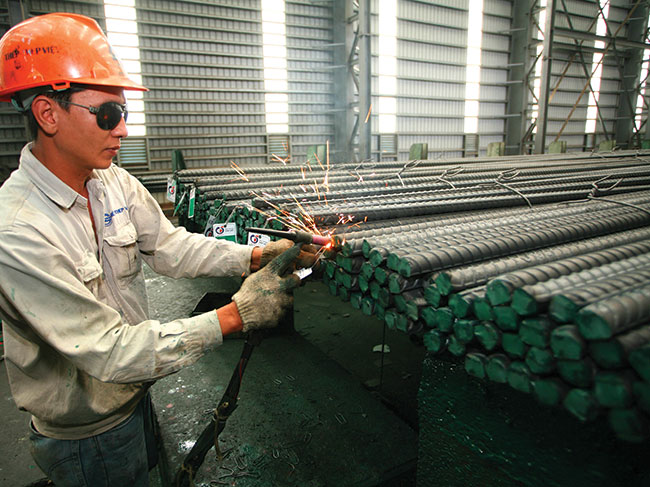Tax used to tackle imports of pig iron

The majority of iron inputs for steel manufacturing in Vietnam is produced domestically
Photo: Le Toan
Under Vietnam’s WTO commitments, the ceiling import duty for such goods is 5 per cent.
According to the General Department of Customs (GDC), 73 per cent of total pig iron imports currently enjoy the 0 per cent tax rate. In monetary terms, this amounts to $12.7 million of the $17.3 million total.
The tax hike was proposed by Korean-invested iron manufacturer Dongbu Vietnam. The firm, which accounts for over 40 per cent of locally produced pig iron, complained that its competitiveness had been undermined by cheap imported pig iron.
According to the company, the average market price of pig iron fell from VND6 million ($275) per tonne in 2015 to the current level of VND4.4 million ($202) per tonne. This dip in market price has resulted in losses for Dongbu, and has even caused the closure of other firms’ factories.
The GDC calculated that the import price has decreased by 25 per cent, down from $392 per tonne in 2014 to $292 per tonne in 2015.
Dongbu said that the company and other iron producers were filing a petition to call for safeguard measures against iron imports. However, since the administrative procedures would take time, producers asked for an immediate intervention in the form of tax policies.
However, due to concerns that the new policy would harm some steel manufacturers that import iron as an input material, the MoF decided to raise the duty to just 3 per cent as opposed to the proposed 5 per cent hike.
Nguyen Van Sua, Deputy Chairman of the Vietnam Steel Manufacturer’s Association endorsed the tax hike, saying “The policy will protect the local iron industry without harming steel production”.
Sua explained that the majority of iron inputs for steel manufacturing had been produced domestically. However, he also suggested that high-quality iron, which is currently used for foundry, should not be taxed due to the shortage of supply locally.
This is not the first time that the MoF has intervened through tax policy with regard to imports. For instance, in January of this year, before an anti-dumping investigation was initiated, the ministry raised the import duty levied on billet and long steel by ten per cent, as cheaply imported products were threatening the local steel sector. Currently, billet and long steel imports are subject to temporary safeguard duties of 23.3 per cent and 14.2 per cent, respectively. This toll comes after Hoa Phat Steel JSC, Southern Steel Co. Ltd, Thai Nguyen Iron and Steel JSC, and Vietnam-Italy Steel JSC called for safeguard measures to be taken against imported products.
The MoF, working in close collaboration with the GDC, has vowed to carefully control customs clearance of the imports.
What the stars mean:
★ Poor ★ ★ Promising ★★★ Good ★★★★ Very good ★★★★★ Exceptional
Latest News
More News
- Vietnamese businesses diversify amid global trade shifts (February 03, 2026 | 17:18)
- Consumer finance sector posts sharp profit growth (February 03, 2026 | 13:05)
- Vietnam and US to launch sixth trade negotiation round (January 30, 2026 | 15:19)
- NAB Innovation Centre underscores Vietnam’s appeal for tech investment (January 30, 2026 | 11:16)
- Vietnam moves towards market-based fuel management with E10 rollout (January 30, 2026 | 11:10)
- Vietnam startup funding enters a period of capital reset (January 30, 2026 | 11:06)
- Vietnam strengthens public debt management with World Bank and IMF (January 30, 2026 | 11:00)
- PM inspects APEC 2027 project progress in An Giang province (January 29, 2026 | 09:00)
- Vietnam among the world’s top 15 trading nations (January 28, 2026 | 17:12)
- Vietnam accelerates preparations for arbitration centre linked to new financial hub (January 28, 2026 | 17:09)














 Mobile Version
Mobile Version